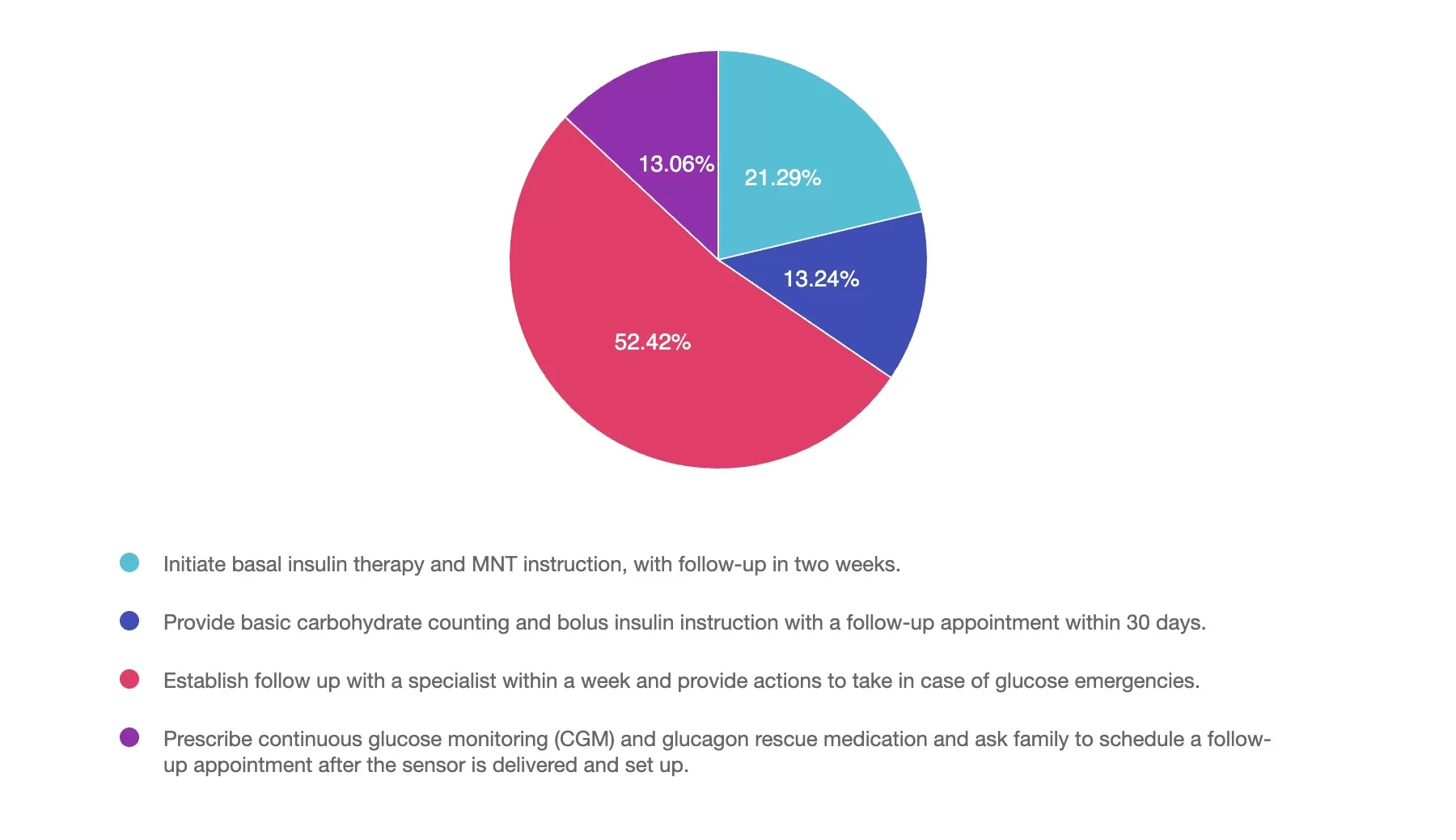For last week’s practice question, we quizzed participants on DKA Prevention After T1D Diagnosis. 52% of respondents chose the best answer. We want to clarify and share this important information, so you can pass it on to people living with diabetes and your colleagues, plus prepare for exam success!
Before we start though, if you don’t want any spoilers and haven’t tried the question yet, you can answer it below: Answer Question

Question: A 10-year-old child with newly diagnosed type 1 diabetes is being discharged from the hospital. Which of the following components is most critical to include in the initial outpatient diabetes management plan to reduce the risk of diabetic ketoacidosis (DKA) and hospital readmission?
Answer Choices:
- Initiate basal insulin therapy and MNT instruction, with follow-up in two weeks.
- Provide basic carbohydrate counting and bolus insulin instruction with a follow-up appointment within 30 days.
- Establish follow up with a specialist within a week and provide actions to take in case of glucose emergencies.
- Prescribe continuous glucose monitoring (CGM) and glucagon rescue medication and ask family to schedule a follow-up appointment after the sensor is delivered and set up.

Getting to the Best Answer
Answer 1 is incorrect. 21% chose this answer, “Initiate basal insulin therapy and MNT instruction, with follow-up in two weeks.” Basal insulin alone is insufficient; children require both basal and bolus insulin to mimic physiologic insulin needs and prevent DKA.
Answer 2 is incorrect. 13% of you chose this answer, “Provide basic carbohydrate counting and bolus insulin instruction with a follow-up appointment within 30 days.” Delayed follow-up increases the risk of complications. Carbohydrate counting and bolus insulin are important, but must be paired with timely, ongoing support.
Answer 3 is correct. About 52% of respondents chose this, “Establish follow up with a specialist within a week and provide actions to take in case of glucose emergencies.” Early involvement of a diabetes specialist and problem solving in case of glucose crises, significantly reduce the risk of DKA and readmission. Frequent follow-up in the first week is associated with better outcomes.
Finally, Answer 4 is incorrect. 13% chose this answer, “Prescribe continuous glucose monitoring (CGM) and glucagon rescue medication and ask family to schedule a follow-up appointment after the sensor is delivered and set up.” While CGM is valuable, delaying education and clinical engagement is risky; immediate education and care planning are essential.
We hope you appreciate this week’s rationale! Thank you so much for taking the time to answer our Question of the Week and participate in this fun learning activity!
Join us live on June 11th @ 11:30am PST!
Level 5 | Mindful Eating for Successful Diabetes Management

Join us live on June 11, 2025, at 11:30 am PST to watch our brand new webinar, Mindful Eating for Successful Diabetes Management by Evgeniya Evans, MS, RDN, CDCES
This engaging and practical webinar, developed by Evgeniya Evans, MS, RDN, CDCES, a positive psychology practitioner, is tailored explicitly for healthcare professionals including dietitians, diabetes care specialists, and providers.
Using evidence-based strategies, participants will gain a deeper understanding of the benefits of incorporating mindfulness into the eating experience, including enhanced glycemic management, improved emotional well-being, and healthier eating behaviors. The webinar includes an overview of mindfulness and mindful eating strategies, such as engaging all five senses, recognizing hunger cues, addressing cravings, and using practical tools to create supportive eating environments.
Participants will also learn how to adapt these approaches to diverse populations and the unique needs of individuals. Join us to deepen your expertise, participate in insightful discussions, and empower individuals to cultivate sustainable, positive relationships with food while achieving long-term health goals.
All hours earned count toward your CDCES Accreditation Information
Sign up for Diabetes Blog Bytes – we post weekly Blog Bytes that are informative and FREE! Every week we post one exam practice Question of the Week and Rationale of the Week. Sign up below!
The use of DES products does not guarantee the successful passage of the certification exam. CBDCE and ADCES do not endorse any preparatory or review materials for the CDCES or BC-ADM exams, except for those published by CBDCE & ADCES.









